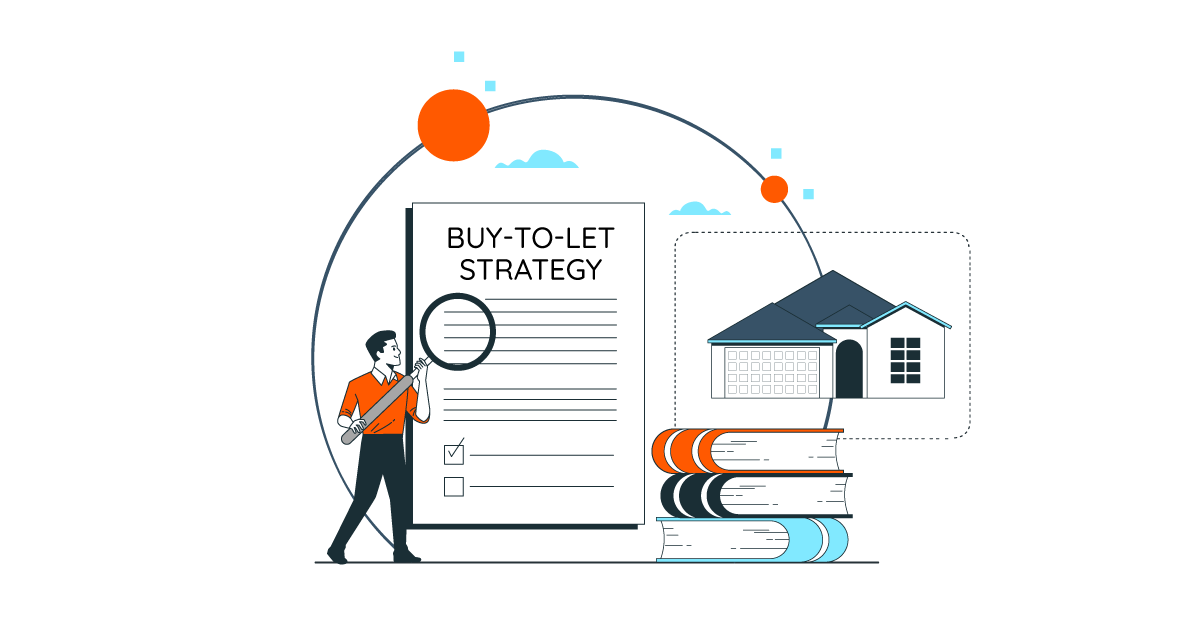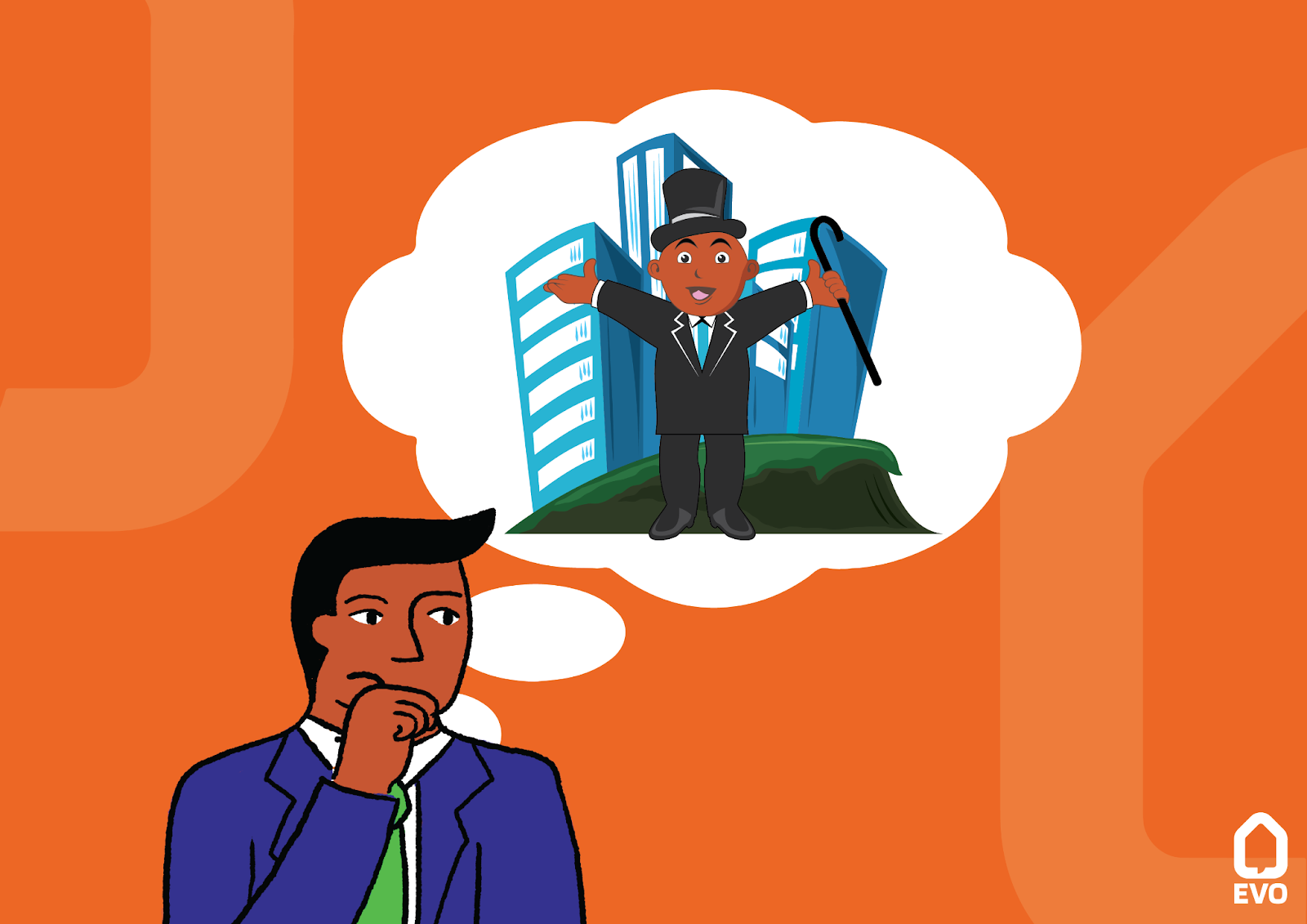
Every business needs a strategy, and property is no different.
Having a buy-to-let strategy is vital, whether you’re starting an empire or buying a single house as a property investment.
It helps you to understand the risks and plan your finances.
A good property investment strategy gives you a consistent plan for handling things during the hard times and the good.
This means you’ll experience fewer nasty surprises, and you’ll find being a landlord more enjoyable.
This step-by-step guide explains how to create a property business plan.
Contents
-
What is a Buy-to-Let Property Business Plan?
-
Things to Consider Before You Become a Landlord
-
Is Buy-to-Let a Good Property Investment?
-
Write a Business Statement
-
Plan Your Finances
-
Research the Property Market
-
Plan How You Will Find Tenants
-
Plan How You Will Manage Your Property
What Is a Buy-to-Let Property Business Plan?
A property investment strategy and a buy-to-let business plan are interchangeable terms.
It’s when you decide what your property business will look like before you start.
You’ll write down:
-
All the decisions you’ll make and try to predict their outcomes
-
Your projected finances
-
The risks you are likely to face and how you will mitigate them
-
How you will deal with problems
-
How you will manage the business on a day-to-day basis
Your business plan can be as long or as short as you want it to be.
But it’s often good to use a template to help you.
That’s why this guide lists all of the areas you should consider.
Things to Consider Before You Become a Landlord
We’re going to assume that you don’t currently own any buy-to-let properties and that you have taken no steps toward doing so.
The first thing to do is decide if becoming a landlord suits you.
Ask yourself:
-
Why do I want to do this? Is it because you want to gain an extra income? Do you want your money to beat inflation? Or do you like the idea of being a landlord?
-
Do I have the time? Being a good landlord can be time-consuming. It’s therefore worth considering how it will fit in with the rest of your life. For example:
-
Do you have a busy full-time job?
-
Do you have children or other family commitments?
-
How far are you willing to travel?
-
Am I happy dealing with tenants, tradespeople, and lettings agents? Being a landlord is all about people. You have to manage and build good relationships with a range of different stakeholders.
-
Am I a good manager? You’ll also need to manage the people listed above. That means being a landlord usually suits someone organised and proactive.
-
Am I happy dealing with problems? Some tenants are very low maintenance. But others report problems on a monthly basis. You need to be prepared to deal with these issues promptly and effectively.
Is Buy-to-Let a Good Property Investment?
The diagram below shows how the UK’s average house price has increased dramatically since 2000. Since 1984 the value of property has dipped a handful of times for a short period.
That doesn’t mean that property prices will continue to increase in future. But it does show that property has been a reliable investment in the past.
Average UK property price 1984–2022
Image courtesy of Tradingeconomics.com
A buy-to-let property is only a good investment if it suits you. It requires a lot more time and effort than other assets.
If you don’t have a lot of time available or you don’t believe you’d be a good landlord then it’s worth asking yourself if there is a better investment available to you.
For example, you may be better off putting your money into stocks, shares or bonds
To help decide if property investment is right for you, ask yourself if you’re comfortable with:
Tightening profit margins
Owning a buy-to-let property is thought to be less profitable than it was ten years ago.
That’s because:
-
Landlord tax breaks have been removed by the government.
-
Buy-to-let mortgages have become more expensive.
-
Regulatory requirements mean that landlords need to pay for more licenses than ever before.
Market volatility
House prices generally rise over the long-term.
But every now and again the market experiences a crash.
This can be incredibly stressful for some landlords. If you’re very risk-averse and don’t like the idea of putting huge sums of money into something that then falls in value, then perhaps property isn’t a good investment for you.
Long-term growth
Being a landlord isn’t a way to get rich quickly. Depending on your financial situation, you may need to invest for several decades before breaking even.
There’s also no guarantee that the huge property price increases of the last 30 years will continue into the future.
No tenants
You might also experience periods where you can’t find any tenants. Not only will you be losing revenue but you may also have to pay additional council tax and other bills if the property is empty for a long period.
Write a Business Statement

This is where you write down the idea behind your business. It’s the big-picture statement that explains what you are trying to achieve.
Before you begin, here are a few tips:
-
Think long term: As mentioned before, it can take some time before your property investment starts to pay dividends, so it’s a good idea to plan decades ahead.
-
Start small: Being a landlord has a steep learning curve. Starting with a single, affordable rental property will help minimise risk and stress and ensure your business is sustainable.
-
Set goals: This helps you to keep track of where you want to be and where you actually are. In turn, this will drive you to get things done. But it also reveals whether your expectations are realistic. If they aren’t, you can adjust your business plan accordingly. Remember to make your goals specific, measurable, achievable, realistic and timely (SMART).
Your business statement should answer these questions:
-
What is my current financial situation?
-
How will having a buy-to-let business change this?
-
Why am I starting this business? As a source of income? As an investment? To be a landlord?
-
How much money am I willing to spend?
-
How much money do I want to make?
-
How many rental properties do I want to own?
-
How will I manage my properties?
-
How long will I own each rental property?
-
What types of property do I want to manage?
💡Pro tip: Be aware of legislation |
|
There’s a ton of legislation out there to regulate landlords. If you decide to rent an investment property it’s important that you are aware of the regulations so you understand your rights, what is expected of you and where the potential pitfalls could be. Key legislation for landlords includes:
In addition, changes are being introduced to section 21 and section 8 of the Homes Act. These will affect your ability to regain possession of your rental property from a tenant, so it’s important to understand them. |
Plan Your Finances

This is probably the most important part of any rental property business plan: the money.
First break down all of your costs. Work out what your costs will be upfront and on a monthly and yearly basis.
Typical landlord expenses include:
Deposit: Today, buy-to-let mortgages require buyers to put down at least 25% upfront. The monthly mortgage interest payments on a 25% interest-only loan can be high and it may reduce your revenue. By putting down a larger deposit, say 30 – 40%, you make your business more resilient.
Stamp duty: Stamp duty on second properties is 3%. That’s a whopping £7,500 on a £250,000 rental property.
Survey fees: A Royal Institute of Chartered Surveyors (RICS) Level One Survey costs £300 – £900. A RICS Level 3 Survey can cost up to £1,500.
Legal costs: £600 - £1,500
Mortgage fees: £1,500 (each time you switch mortgage)
Insurance: Basic insurance on a house with a £200,000 rebuild cost starts at £170 ( per annum).
Energy Performance Certificate (EPC): £100
Electrical safety Certificate: £125 - £300 (required every 5 years)
Gas safety Certificate: £60 - £90 (required annually)
Advertising fees: Variable
Letting agency fees: between 10% and 18% of monthly rental income
Tax: How much income tax you pay depends on how much money you earn. A basic rate taxpayer with a rental income of £15,000 per year would pay £3,000. Higher-rate taxpayers would have to fork out £6,000.
💡Pro tip: Consider setting up a limited company |
|
Higher-rate taxpayers may benefit from setting up a limited company for their buy-to-let business. It would be taxed separately and at a lower rate. From April 2023 UK corporation tax is 25%. You can withdraw dividends up to £2,000 per year, tax-free. But this might also be a good idea for a basic rate taxpayer. If your business is set up with you working as a sole trader, HMRC will add your rental income to your other earnings and tax it, which could push you into the higher rate category. |
Interest-only or repayment buy-to-let mortgage?
Another thing to consider when financial planning is what kind of buy-to-let mortgage you will get.
Most landlords get an interest-only mortgage because the monthly payments are much lower.
But the downside is that you won’t repay the mortgage, meaning you will own less equity in the property.
This is where you need to think about your goals.
If you are buying a property for rental income, then not owning equity isn’t a problem.
But if you have bought the property to sell for a profit or to build wealth, it could be an issue.
That’s because, with an interest-only mortgage, you own less equity in the house. Most of the money you make when you sell it will be from house prices increasing.
But there is no guarantee that this will happen. Plus, you could get less for your property than you expected if property prices crash when you decide to sell-up.
With a repayment mortgage, you will gradually pay off the mortgage over time, which gives you more equity in the property. This could help secure a return on your property investment.
Calculate rental yield
Another thing to consider when planning your finances is rental yield. This figure tells you how profitable a property is.
To be accepted for a buy-to-let mortgage a property’s rental yield needs to be 125% of the annual mortgage interest payments, or 25% higher than your mortgage rate.
Here’s how to calculate rental yield:
-
Work out the property’s annual rental income
-
Divide it by the sum you paid for the property
-
Multiply this figure by 100
-
Convert it into a percentage
Let’s say you’re planning to buy a £250,000 two-bedroom house near Bristol. Most similar properties in the area are being rented for £1,000 per month.
Your lender is offering a mortgage interest rate of 3.84%.
-
1,000 x 12 = 12,000
-
12,000 / 250,000 = 0.048
-
0.048 x 100 = 4.8
4.8 is 25% more than 3.84, so this house would just scrape the affordability test. If the house price were any higher or the monthly income any lower, it would fail.
Research the Property Market
Now that you know your expenses, it’s time to work out how much you should spend on a property and what you should charge for it.
It’s a good idea to research what properties you can get for your budget and how much they are being rented for.
This helps you decide which sort of property best matches your goals and financial situation.
This can be done by going on a website like Rightmove and looking in the “property to rent” section.
Get a feel for what other landlords charge. Take into account the property’s size, type and location.
Working this out helps you avoid putting offers in on properties that later turn out to be unprofitable. It will also help narrow down your property search.
Here are some tips for your property search:
✔️Know the area: Some budding landlords will look at the entire country and buy a property that appears to be a bargain. That’s not necessarily a bad approach, but it’s important you research the area to find out why the property is such a bargain. You may find that rental demand in the area is low and you will struggle to get a tenant or a decent income.
✔️Look for tenant demand: It’s a good idea to buy properties in areas with high demand. Cities with large universities or hospitals often have many tenants looking for a home. There also might be higher demand near good schools, parks and other amenities.
✔️Look for properties that are likely to increase in value: If your aim is to sell your property for a profit then it’s important to get a house that is likely to increase in value. There are variations in house price growth between regions, cities and even local areas.
For example, house prices in most regions of the UK have increased gradually over the last 10 years. But in the North of England, they have increased rapidly.
What type of property will you buy?
The type of property you purchase has a big impact on your costs and responsibilities.
House of Multiple Occupancy (HMO)
An HMO is where you rent your property to at least three tenants from more than one household. Tenants will usually have their own private areas but certain facilities like kitchens, bathrooms and living areas may be shared.
HMOs allow you to earn more rent from your property. But they are also highly regulated. You need to meet a raft of different requirements and obtain certain licenses. This can be complicated, time-consuming and expensive.
Student accommodation
You may choose to convert a house into student accommodation. This can be effective near universities and colleges.
The downside of this is that you’ll need to look for new tenants regularly. Plus, some students don’t look after their homes as well as more permanent tenants would. The time and money you spend on fixing and replacing things at your property might be higher than usual. You’ll also need to fulfil HMO requirements if you are going to rent the rooms out individually.
Another downside is that students often leave during the summer or during term breaks. You may need to provide tenancies that reflect this, which could lead to gaps in rental income.
You can also buy purpose-built student accommodation. This usually has better rental income potential because students will be attracted to it. But the capital growth won’t be as much because the property can’t be used for other purposes.
Flat or house?
There are a few obvious differences between renting a house and a flat. Houses can usually get a higher price because they often have more space and amenities like gardens.
But another, more important factor is that most flats are leasehold. This means that you won’t own the land the property is built on and you will have to pay ground rent and a service charge to the freeholder. This adds additional costs and generally makes being a landlord more challenging.
The upside of flats is they are generally cheaper to buy than houses. This means they can be a good choice for first-time landlords on a very low budget. However, it’s important to bear in mind that most flats are sold under a leasehold contract. This means that you’ll need to pay fees to the leaseholder, which could eat into your profits.
Consider a commercial unit
Another option is to let commercial property. In other words, you buy a building that you rent to one or more businesses.
The size of the property you buy could range from a single shop that you let to one company to a full office block that you rent to multiple businesses.
There are a number of benefits to doing this:
-
The rental yields are higher
-
You don’t have to pay stamp duty
-
You’ll be subject to less regulation
-
Longer lease periods of 5 – 10 years
The downside to letting commercial property is that it is high risk:
-
Higher mortgage rates
-
Your success depends on your tenant’s businesses being profitable enough to pay rent
-
You need to be able to assess potential tenants to ensure they will be profitable
-
You are more exposed to government legislation on things such as business rates
If you want to let commercial property then you need a commercial mortgage. To get this, you’ll probably have to prove that you are experienced.
You might also have to sign up for a long-term agreement with a lender, perhaps up to 15 years.
The mortgage fees also vary depending on the size and type of property that you buy. A large office block will usually cost a lot more in fees than a small shop.
Plan How You Will Find Tenants
You’ve done the financial planning, you’ve researched the housing market, and you’ve purchased a property.
Now the hard work begins. Step one is to find some tenants to live on your property. There are four steps to this.
Create a clear, comprehensive tenancy agreement
Your tenancy agreement should be detailed and leave no doubt as to where each party’s responsibilities lie.
For example, will the tenant be required to look after the garden or will you do that? If you want the tenant to do it then what standards do you expect to be upheld? What happens if they fail to meet them?
Any grey areas in your tenancy agreement could lead to disputes. This could cost you money, lead to your property not being looked after properly, and result in poor tenant relations.
If you hire a letting agent then they will usually provide a tenancy agreement for you. It’s always a good idea to check it thoroughly.
If you decide to write your own tenancy agreement then visit the GOV.UK website. It has a comprehensive list of things you should include in your tenancy agreement as well as a template that you can download and use.
Advertise your property
Step two is to advertise your property. There are two main ways to do this:
-
Advertise your property on relevant websites
-
Pay a letting agent or tenant referencing agency to advertise your property and find tenants for you
If you choose to do it yourself, you can advertise on local news sites or websites like Gumtree. But the best solution is to go on a website like Rightmove or Zoopla.
Vet prospective tenants
It’s important to vet your prospective tenants to make sure they can afford to pay the rent and that they don’t present a risk to your property.
If you hire a letting agent or tenant referencing agency then they will do this for you. But if you don't, then you’ll have to do it.
Here are some of the checks you should perform:
-
Check that the tenant has a right to live in the UK.
-
Ask to get a reference from a previous landlord and their employer.
-
Ask to see three months’ payslips and bank statements.
-
Carry out a credit and fraud prevention check using a service like Equifax.
-
Check the Register of Judgements, Orders and Fines to see if they have a County Court judgement (CCJ) against them.
Sign up to a deposit protection scheme
The deposit you charge cannot be more than five weeks rent. By law, you have to store it in a tenancy deposit protection scheme.
These are government-backed schemes that ensure the tenant gets their deposit back if they have:
-
Complied with their tenancy agreement
-
Have not damaged your property
-
Have paid their rent and bills
There are three schemes in England and Wales:
If you think your tenant has failed to meet one of the conditions and you want to claim some of the deposit to cover it, you will need to raise a dispute with your deposit protection scheme.
Plan How You Will Manage Your Property
Now you have a plan in place for buying your property and getting tenants, it’s time to think about how you will manage your property.
There are two main areas that you need to focus on: your tenants and the property itself.
Foster good relations with tenants
It’s important to remember that your property isn’t just an investment, it’s also someone’s home.
As a landlord, you’ll strive to provide the best tenant experience you can.
Being a good landlord benefits you too:
-
Your tenants will be more likely to stay for longer, saving you time and money looking for new ones.
-
Your tenant will be more likely to care for your property.
-
You’ll be less likely to have a dispute with your tenant.
-
You’ll get a good reputation as a landlord.
-
You’ll experience less stress.`
There are three key areas that you and your tenant need to take responsibility for:
-
Caring for the property
-
Communication
-
Reporting problems
Your buy-to-let strategy and rental property business plan should detail how you will achieve these things.
Caring for the property
As a landlord, you have a legal duty to ensure that your buy-to-let property is in a habitable condition. You’re also responsible for the health and safety of the building.
This means any repairs or maintenance work needs to be dealt with as soon as is reasonably possible.
But you should go beyond these basic requirements. You need to show your tenant that you care about keeping your buy-to-let property in top condition.
If you do this, most tenants will treat the property with a similar level of respect.
💡Pro tip: Plan regular property inspections |
|
One way to ensure that your property is safe, well-maintained and compliant with regulations is to perform annual inspections. This allows you to see what needs replacing or fixing. Use an inspection checklist to make sure you don’t miss anything and book any maintenance work as soon as possible. |
Communication
Good communication is key as a landlord. But it’s also a difficult balance to strike.
Tenants need to know that they can come to you for anything. You need to be able to:
-
Respond to them and deal with their requests quickly.
-
Keep them informed of when issues will be resolved.
-
Give them plenty of notice when you or a tradesperson will visit the property.
Tenants have a legal right to quiet enjoyment of the property. This means that you need to give them at least 24-hours notice if you are going to visit, but this is a minimum and a few weeks is usually better. It also means you can’t go into the property unless it’s important.
Also no-one really wants their landlord to keep contacting them or showing up at their house, so it’s a good idea to leave your tenants alone as much as possible.
You need to communicate well and care for your property and tenant, without being intrusive.
💡Pro tip: Communicate with a digital platform |
|
Most people under 40 expect to be able to use mobile phone apps to engage with services. A digital platform like EVO allows tenants to report issues to you quickly and conveniently. You can also use it to communicate with them in a way they are used to and comfortable with. For example, to arrange an inspection visit. The system is fast, convenient and unobtrusive. |
Reporting problems
This often leads to disputes between tenants and landlords. Tenants may feel their landlord isn’t dealing with their issues quickly. Landlords may feel their tenants fail to report issues early enough or not at all.
Sometimes problems take longer to solve because they weren’t described clearly by the tenant. This might lead to you sending the wrong tradesperson to fix an issue, for example.
There are three main ways to make sure that reporting issues don’t become a problem:
-
As mentioned above, conduct regular inspections to make sure problems are dealt with early.
-
Make it convenient for your tenant to report issues in detail.
-
Keep the tenant informed of progress.
💡Pro tip: Manage repairs digitally |
Digital services like EVO can also make repairs and maintenance simple and effective. By using an app your tenants can report a problem using their mobile phone. They can describe the issue, take pictures and videos, and book an appointment. They’ll be put in touch with the next-available suitably qualified person. They’ll be shown a picture introducing that tradesperson and they’ll be able to communicate with them. On the day of the repair, they’ll be able to see an estimated time of arrival and even see how far away the person is. |
Keep your property compliant and in good shape
Managing your property can be split into two broad areas:
-
Compliance: These are things required by law.
-
Maintenance and repair: Things that you should do to ensure your property stays well-maintained.
It’s a good idea to have systems in place to make sure both types of tasks are performed efficiently and on time.
This will keep your tenants happy and help you avoid a regulatory fine.
Compliance
Here are the compliance requirements you need to prepare for:
Human habitation
Under the Homes Act 2018, you need to make sure your property is fit for human habitation. That means the building needs to:
-
Be stable
-
Be in good condition
-
Not have damp or condensation
-
Have a safe layout
-
Have suitable natural light
-
Have suitable ventilation
-
Have both hot and cold water supplies
-
Have working drainage and toilets
-
Not make it difficult to cook or wash up
Gas
You must have all gas equipment checked and maintained once per year by a Gas Safe registered engineer. You then need to provide your tenant with the engineer’s report within 28 days of the check.
Electricity
You need to commission new electrical checks once every five years for existing tenancies. You’ll need to get a qualified electrician who can provide you with an Electrical Installation Condition Report (EICR). You then have 28 days to send a copy of this report to your tenant.
You must also regularly check the electrical safety of any appliances supplied.
Energy performance certificate (EPC)
Landlords are required by law to get a new energy performance certificate (EPC) for each property and give a copy of it to each new tenant. EPCs rate properties based on the efficiency of its insulation, heating, lighting, etc. The most efficient properties are rated A and the least efficient are rated G. Properties must be rated E or above before each new tenancy or they cannot be rented out. From 2025 all new properties must be rated at least C to be let. All existing rental properties must meet the same standard by 2028.
Carbon monoxide and smoke alarms
You are required by law to ensure that carbon monoxide and smoke alarms are fitted correctly and are working at the start of each tenancy.
Fire safety
If you supply furniture then it must be fire safe. If your property is an HMO then you must supply fire extinguishers.
Legionella
Legionella is a bacteria that can cause deadly illness. If your property has cold water storage then you need to perform a legionella risk assessment on it every two years.
HMOs
There’s a tonne of legislation and requirements surrounding HMOs. Check out our article on HMO licensing to find out more.
Licenses
There are several licenses that you may require to rent a property, depending on your circumstances.
The cost of each also varies, but is usually between £700 – £1,420
Large HMO: If your property has at least five occupants who do not form a single household then it must be licensed.
Additional licensing schemes: These are licenses that often apply to smaller HMOs. They are usually issued by your local council. You need to check with them if you need one.
Selective licensing schemes: These are also issued by local authorities. They usually apply to all rented properties in a certain area. Once again, you need to check with your local council if you need one.
Managing trades
Another thing to consider is how you will manage the people who perform the maintenance and repairs on your property.
When it comes to handling property maintenance you have three choices:
🧰Do it yourself: This could save you money on labour costs. But you’ll need to have good DIY skills and be available to visit your property at any time.
🧰Hire trades: Tradespeople are often reliable and will do a good job. But they require a lot of organisation and you may struggle to find someone who responds quickly.
🧰Employ a team: This is high-risk and requires a lot of organisation, but might be good if you have a lot of properties.
🧰Use a third-party end-to-end digital service provider: These are companies that can provide digitally managed services at a fraction of the cost of traditional letting agents.
💡Pro tip: Use an app to manage tradespeople |
|
One of the easiest ways to manage your property maintenance is to use a platform like EVO. It allows your tenants to request a repair. EVO’s system will then book the job with the next available suitably-skilled tradesperson. This means the issue is dealt with quickly and efficiently. It also means less hassle for you. Plus, you can see all of your maintenance jobs on a single dashboard, so you are in control. |
Conclusion
Congratulations! If you’ve completed all of the sections in this guide, then you’ve taken the first step in your property investment journey.
As experienced landlords and property management experts, we know how fulfilling and financially rewarding this can be.
But we also know that it’s not easy and you’ll need to work hard to be a good landlord.
That’s why we created EVO. It’s a digital platform that brings together landlords, tenants and tradespeople on one platform.
It provides an efficient and hassle-free way to manage maintenance, repairs and compliance.
The whole thing is delivered via a secure, easy-to-use digital platform that allows you to focus on your day job.
✔️Low time commitment
✔️End-to-end solution
✔️Seamless compliance management
✔️Dashboard provides an overview of all properties and jobs
✔️Get a tradesperson whenever you need one
✔️Accredited skills network
✔️Scalable payments from just £5 per month
✔️Provides Service history of work carried out at properties
✔️ Improves communication
Call us on +44 (0)20 8691 9293 or email hello@evo-pm.com to find out how we can take the hassle out of managing your properties.
PHOTO BY EVO


